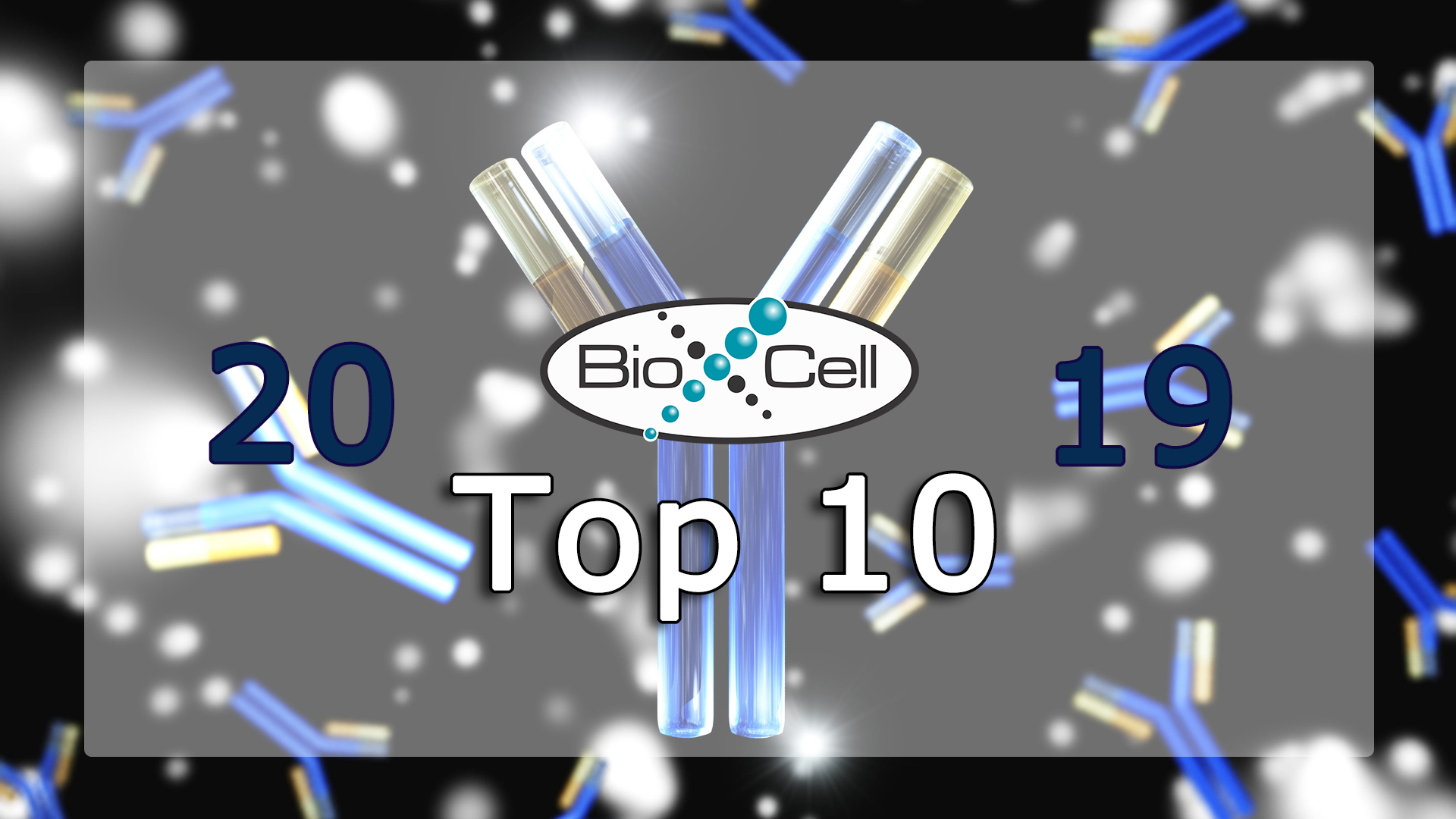
Bio X Cell's Top Ten Antibodies in 2019
- InVivoMAb anti-mouse PD-1 (CD279)
Clone: RMP1-14
Catalog #: BE0146
The RMP1-14 monoclonal antibody reacts with mouse PD-1 (programmed death-1) also known as CD279. PD-1 is a 50-55 kDa cell surface receptor encoded by the Pdcd1 gene that belongs to the CD28 family of the Ig superfamily. PD-1 is transiently expressed on CD4 and CD8 thymocytes as well as activated T and B lymphocytes and myeloid cells. PD-1 expression declines after successful elimination of antigen. Read More...
- InVivoMAb rat IgG2a isotype control, anti-trinitrophenol
Clone: 2A3
Catalog #: BE0089
The 2A3 monoclonal antibody reacts with trinitrophenol. Because trinitrophenol is not expressed by mammals this antibody is ideal for use as an isotype-matched control for rat IgG2a antibodies in most in vivo and in vitro applications.
- InVivoMAb anti-mouse PD-L1 (B7-H1)
Clone: 10F.9G2
Catalog #: BE0101
The 10F.9G2 monoclonal antibody reacts with mouse PD-L1 (programmed death ligand 1) also known as B7-H1 or CD274. PD-L1 is a 40 kDa type I transmembrane protein that belongs to the B7 family of the Ig superfamily. PD-L1 is expressed on T lymphocytes, B lymphocytes, NK cells, dendritic cells, as well as IFNγ stimulated monocytes, epithelial cells and endothelial cells. Read More...
- InVivoPlus anti-mouse PD-1 (CD279)
Clone: RMP1-14
Catalog #: BP0146
The RMP1-14 monoclonal antibody reacts with mouse PD-1 (programmed death-1) also known as CD279. PD-1 is a 50-55 kDa cell surface receptor encoded by the Pdcd1 gene that belongs to the CD28 family of the Ig superfamily. PD-1 is transiently expressed on CD4 and CD8 thymocytes as well as activated T and B lymphocytes and myeloid cells. PD-1 expression declines after successful elimination of antigen. Read More...
- InVivoMAb rat IgG2b isotype control, anti-keyhole limpet hemocyanin
Clone: LTF-2
Catalog #: BE0090
The LTF-2 monoclonal antibody reacts with keyhole limpet hemocyanin (KLH). Because KLH is not expressed by mammals this antibody is ideal for use as an isotype-matched control for rat IgG2b antibodies in most in vivo and in vitro applications.
- InVivoPlus rat IgG2a isotype control, anti-trinitrophenol
Clone: 2A3
Catalog #: BP0089
The 2A3 monoclonal antibody reacts with trinitrophenol. Because trinitrophenol is not expressed by mammals this antibody is ideal for use as an isotype-matched control for rat IgG2a antibodies in most in vivo and in vitro applications.
- InVivoMAb anti-mouse CD4
Clone: GK1.5
Catalog #: BE0003-1
The GK1.5 monoclonal antibody reacts with the mouse CD4. The CD4 antigen is a 55 kDa cell surface type I membrane glycoprotein belonging to the immunoglobulin superfamily. CD4 acts as a co-receptor which in cooperation with the T cell receptor (TCR) interacts with class II MHC molecules displayed by antigen presenting cells (APC). Read More...
- InVivoMAb anti-mouse CTLA-4 (CD152)
Clone: 9H10
Catalog #: BE0131
The 9H10 monoclonal antibody reacts with mouse CTLA-4 (cytotoxic T lymphocyte antigen-4) also known as CD152. CTLA-4 is a 33 kDa cell surface receptor encoded by the Ctla4 gene that belongs to the CD28 family of the Ig superfamily. CTLA-4 is expressed on activated T and B lymphocytes. CTLA-4 is structurally similar to the T-cell co-stimulatory protein, CD28, and both molecules bind to the B7 family members B7-1 (CD80) and B7-2 (CD86). Read More...
- InVivoPlus anti-mouse PD-L1 (B7-H1)
Clone: 10F.9G2
Catalog #: BP0101
The 10F.9G2 monoclonal antibody reacts with mouse PD-L1 (programmed death ligand 1) also known as B7-H1 or CD274. PD-L1 is a 40 kDa type I transmembrane protein that belongs to the B7 family of the Ig superfamily. PD-L1 is expressed on T lymphocytes, B lymphocytes, NK cells, dendritic cells, as well as IFNγ stimulated monocytes, epithelial cells and endothelial cells. PD-L1 binds to its receptor, PD-1, found on CD4 and CD8 thymocytes as well as activated T and B lymphocytes and myeloid cells. Read More...
- InVivoMAb mouse IgG1 isotype control, unknown specificity
Clone: MOPC-21
Catalog #: BE0083
The MOPC-21 monoclonal antibody is ideal for use as a non-reactive isotype-matched control for mouse IgG1 antibodies in most in vivo and in vitro applications.
